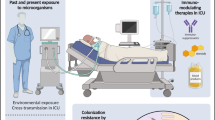Abstract
Febrile neutropenia frequently develops after chemotherapy, and the prompt administration of antimicrobial agents is required for treatment. In the present study, we searched for predictive factors for the failure of the initial antimicrobial agents used for febrile neutropenia (FN) in patients with lung cancer. Sixty FN patients treated in our ward from June 2005 to May 2011 were retrospectively analyzed. The definition of FN and the response to antimicrobial agents were determined by the Japanese guidelines. We divided the FN patients into two groups by their response to the initial antimicrobial agents. Next, the characteristics of the two groups were compared. The Multinational Association of Supportive Care in Cancer (MASCC) score did not differ between the two groups. The non-responder group demonstrated significant elevation of serum C-reactive protein (CRP) level. A multivariate analysis demonstrated that a CRP level higher than 10 mg/dl is an independent risk factor for the failure of initial antimicrobial agents for FN with lung cancer (OR 11.0, 95 % CI 1.635–74.5). When the CRP score was added to the MASCC score, the scoring system could more precisely predict the failure of initial antimicrobial agents in patients with lung cancer who developed febrile neutropenia.
Similar content being viewed by others
References
Kuderer NM, Dale DC, Crawford J, Cosler LE, Lyman GH. Mortality, morbidity and cost associated with febrile neutropenia in adult cancer patients. Cancer (Phila). 2006;106:2258–66.
Hughes WT, Armstrong D, Bodey GP, Feld R, Mandell GL, Meyers JD, et al. From the Infectious Diseases Society of America guidelines for the use of antimicrobial agents in neutropenic patients with unexplained fever. J Infect Dis. 1990;161:381–96.
Hughes WT, Armstrong D, Bodey GP, Brown AE, Edwards JE, Feld R, et al. 1997 guidelines for the use of antimicrobial agents in neutropenic patients with unexplained fever. Clin Infect Dis. 1997;25:551–73.
Hughes WT, Armstrong D, Bodey GP, Bow EJ, Brown AE, Calandra T, et al. 2002 guidelines for the use of antimicrobial agents in neutropenic patients with cancer. Clin Infect Dis. 2002;34:730–51.
Freifeld AG, Bow EJ, Sepkowitz KA, Boeckh MJ, Ito JI, Mullen CA, et al. Clinical practice guideline for the use of antimicrobial agents in neutropenic patients with cancer: 2010 update by the Infectious Diseases Society of America. Clin Infect Dis. 2011;52:e56–93.
Masaoka T. Conclusions and recommendations: evidence-based recommendations on antimicrobial use in febrile neutropenia in Japan. Int J Hematol. 1998;68:S5–6.
Masaoka T. Evidence-based recommendations for antimicrobial use in febrile neutropenia in Japan: executive summary. Clin Infect Dis. 2004;39:S49–52.
Klastersky J, Paesmans M, Ruvbenstein EB, Bover M, Elting L, Feld R, et al. The multinational association for supportive care in cancer risk index: a multinational scoring system for identifying low-risk febrile neutropenic cancer patients. J Clin Oncol. 2000;16:3038–51.
Fujita M, Tokunaga S, Ikegame S, Harada E, Matsumoto T, Uchino J, et al. Identifying risk factors for refractory febrile neutropenia in patients with lung cancer. J Infect Chemother. 2012;18:53–8.
Chalmers JD, Singanayagam A, Hill AT. C-reactive protein is an independent predictor of severity in community-acquired pneumonia. Am J Med. 2008;121:219–25.
Tillett WS, Francis T. Serological reactions in pneumonia with a nonprotein somatic fraction of pneumococcus. J Exp Med. 1930;53:561–71.
Grivennikov SI, Greten FR, Karin M. Immunity, inflammation, and cancer. Cell. 2010;140:883–9.
Slatore CG, Au DH, Littman AJ, Satia JA, White E. Association of nonsteroidal anti-inflammatory drugs with lung cancer: result from a large cohort study. Cancer Epidemiol Biomarkers Prev. 2009;18:1203–7.
Mandell LA, Wunderink RG, Anzueto A, Bartlett JG, Campbell GD, Dean NC, et al. Infectious Diseases Society of America/American Thoracic Society consensus guideline on the management of community-acquired pneumonia in adults. Clin Infect Dis. 2007;44:s27–72.
Neill AM, Martin IR, Weir R, Anderson R, Chereshsky A, Epton MJ, et al. Community acquired pneumonia: aetiology and usefulness of severity criteria on admission. Thorax. 1996;51:1010–6.
The committee for the Japanese Respiratory Society guidelines in the management of Respiratory Infections. The Japanese Respiratory Society guidelines for the management of hospital-acquired pneumonia in adults 2008. Respirology. 2009;14:S1–71.
Bajwa EK, Khan UA, Januzzi JL, Gong MN, Thompson BT, Christiani DC. Plasma C-reactive protein levels are associated with improved outcome in ARDS. Chest. 2009;136:471–80.
Fleischhack G, Hartmann C, Simon A, Wulff B, Havers W, Marklein G, et al. Meropenem versus ceftazidime as empirical monotherapy in febrile neutropenia of paediatric patients with cancer. J Antimicrob Chemother. 2001;47:841–53.
Fujita M, Ouchi H, Inoue Y, Inoshima I, Ohshima T, Yoshimura C, et al. Clinical efficacy and safety of cefepime in febrile neutropenic patients with lung cancer. J Infect Chemother. 2010;16:113–7.
Ohmagari N, Graviss H, Graviss L, Hackett B, Perego C, Gonzalez V, et al. Risk factors for infections with multidrug-resistant Pseudomonas aeruginosa in patients with cancer. Cancer (Phila). 2005;104:205–12.
American Thoracic Society and the Infectious Diseases Society of America. Guidelines for the management of adults with hospital-acquired, ventilator-associated, and healthcare-associated pneumonia. Am J Respir Crit Care Med. 2005;171:388–416.
Kett DH, Cano E, Quartin AA, Mangino J, Zervos MJ, Peyrani P, et al. Implementation of guideline for management of possible multidrug-resistant pneumonia in intensive care: an observational, multicentre cohort study. Lancet Infect Dis. 2011;11:181–9.
Acknowledgments
We appreciate the assistance of Dr. Brian Quinn for editing the manuscript and ensuring correct English usage.
Conflict of interest
None.
Author information
Authors and Affiliations
Corresponding author
About this article
Cite this article
Matsumoto, T., Fujita, M., Hirota, T. et al. Elevation of serum C-reactive protein predicts failure of the initial antimicrobial treatment for febrile neutropenia with lung cancer. J Infect Chemother 19, 202–207 (2013). https://doi.org/10.1007/s10156-012-0474-8
Received:
Accepted:
Published:
Issue Date:
DOI: https://doi.org/10.1007/s10156-012-0474-8




